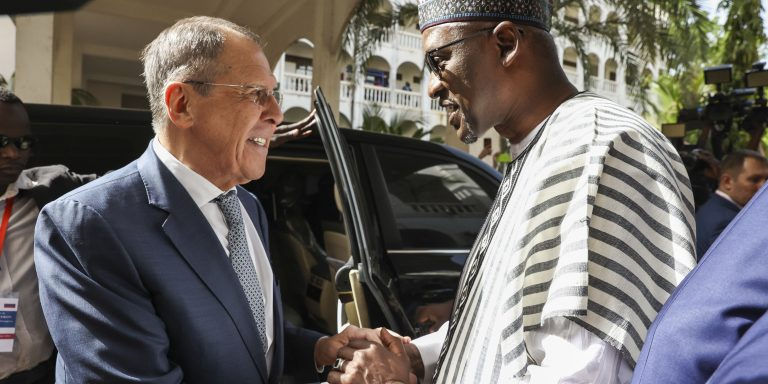- Russia is actively seeking political influence in the Sahel through ostensible support for counter-insurgency efforts amid the drawdown of the longstanding French counterterrorism forces in that region.
- Russian has capitalized on cold U.S. relationships with Sahelian states that are confronting challenges in democratic governance in its attempt to create a new Russian-led security order in the region.
- Russia exerts military influence in the Sahel largely through the Wagner Group private military company operating alongside Sahelian soldiers, but this has not led to counter-insurgency success and, in contrast, has often exacerbated insecurity.
- While France appears unlikely to regain influence in the Sahel, a combination of tactful diplomacy and military support to meet the Sahelian states’ actual needs could allow the United States to become a preferred partner, especially if Russian support proves underwhelming.
During a February 7 meeting with his Malian counterpart, Russian foreign minister Sergey Lavrov announced that Russia would continue delivering military support, in addition to development assistance and humanitarian aid, to Mali. Lavrov also indicated that Russia would extend counterterrorism assistance to Guinea, Burkina Faso, Chad, and other countries in the broader Sahel region. His trip to Mali – said to be the first visit to the country by the head of Russia’s foreign ministry – marks Lavrov’s third trip to the African continent in eight months. Although Russia often couches its relations with Sahelian countries in military — specifically counterterrorism — terms, it is capitalizing politically on the antipathy of Sahelian post-coup governments towards France and the United States as the latter two countries have distanced themselves from these governments.
As a result of recent coups in Mali (2020 and 2021), Guinea (2021), and Burkina Faso (January and September 2022), the three countries have been suspended from the Africa Union (AU), and were subsequently barred from attending the United States-Africa Leaders Summit in Washington, D.C this past December. Following Lavrov’s visit to Mali, the three countries’ top diplomats came together to call for their reinstatement into the AU and said they would “combine their efforts” to deal with ongoing security issues.
After acting as the Sahel’s regional security guarantor for decades, France announced last month that it would withdraw its ambassador and troops from Burkina Faso, where it had relocated 400 Special Forces operators since the end of its operation in Mali, at the request of the country’s military junta. France withdrew its troops from Mali last year, ending its nearly ten-year counterinsurgency operation Barkhane in the country. The Malian military junta has welcomed the private military contractors Wagner Group to train and operate alongside its own soldiers fighting al-Qaeda and ISIS-aligned jihadists in the country. Russia also delivered fighter jets and helicopters to Mali in 2021. In late January, a group of UN-appointed experts called for an investigation into massacres of “several hundred people” allegedly carried out by Malian and Wagner forces in March 2022. With French forces removed from both Mali and Burkina Faso amid a heightened jihadist threat, the Sahel’s security situation is only likely to deteriorate.
Following the death of Chad’s long-standing leader, Idriss Déby, in 2021 at the hands of rebels whom the country’s former foreign minister claimed were trained by Wagner Group personnel, the country has faced political turmoil that makes it another viable target for Russian influence. After assuming the country’s leadership as part of a Transitional Military Council and suspending its constitution, Déby’s son, Mahamat Idriss Déby, commenced a dialogue with many of the country’s rebel and opposition groups, who met in Doha, Qatar, last summer. While the transitional government was meant to return power to civilian rule in October 2022, the younger Déby instead declared himself interim president, leading to protests and a violent crackdown that saw as many as 200 demonstrators killed and over 300 sentenced to a prison which the Chadian Human Rights League has described as a “Chadian Guantánamo.” While some AU members called for Chad’s suspension from the regional bloc, the AU ultimately elected not to do so. Déby also attended this December’s African Leaders Summit, despite the protestations of several high-level U.S officials on African affairs, foreign policy publications, and rights groups.
Beyond the fact that the Wagner Group has been implicated in human rights abuses in the Sahel — and certainly elsewhere from Libya to Syria to Ukraine — and that its mercenaries lack experience in the Sahel and knowledge of the region’s languages and cultures, there is little chance Russia will positively impact counter-insurgency and broader security efforts in the Sahel. On the contrary, Russian support to these militaries may line the coffers of those countries’ new military rulers. The West accordingly faces foreign policy challenges as it balances its desire to see the security situation improve with offering “carrots and sticks” to those countries regarding democratic reforms after their coups. The new U.S. approach of “partner-led, U.S. enabled” counterterrorism cooperation may also prove risky in a region where partnerships have been fickle and groups like Wagner are gaining influence at their expense. Increased insecurity can also jeopardize prospects of success for international efforts such as UN peace operations in the region.
At present Mali and Burkina Faso have decisively turned to the Russian camp. Meanwhile, Guinea and Chad, the latter of which has played a central role in combatting jihadist insurgencies in both the Sahel and Nigeria, hang in the balance. A combination of tactful diplomacy and the types of military support that these countries truly need will be among the only ways for the West to regain influence in the Sahel and improve the region’s security.

